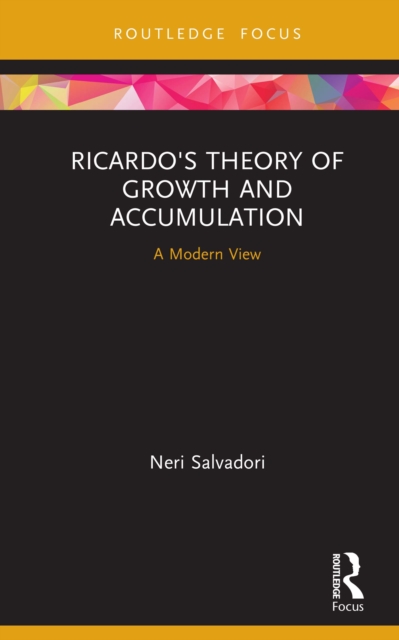
Ricardo's Theory of Growth and Accumulation : A Modern View EPUB
by Neri Salvadori
Part of the The Graz Schumpeter Lectures series
EPUB
Description
In the aftermath of the Napoleonic Wars Britain found itself faced with a stagnant economy.
Economist David Ricardo believed that the full re-integration of Britain into the world market would allow for both capital accumulation and population growth, and used arguments that anticipate ideas entertained in modern contributions to the theory of economic growth and development.
However, several of these arguments have not yet been translated into the language of modern classical economics.
Ricardo’s Theory of Growth and Accumulation seeks to overcome this striking lacuna. The latest entry in the Graz Schumpeter lecture series, this text explores and elaborates Ricardo’s arguments and the models utilized by those who subsequently followed in support of his work.
The Ricardian system is first examined through a one-sector economy, following Kaldor’s model, and a two-sector economy, following Pasinetti’s model.
These building blocks are developed through the exploration of a small open economy, which allows an analysis of the impact of international trade in exceedingly simple circumstances.
This discussion expands further by considering the world economy.
More sophisticated variants of the two-sector model are presented, in which commodity prices are endogenously determined by the trading interplay amongst several countries.
A final analysis makes Ricardo’s case by introducing accumulation in the world economy. This book is of interest to students and scholars of Ricardo, classical economics, and – more broadly – growth theory, the theory of international economics, and globalization.
The author was keen to render the analytical parts compelling to the historian and the historical parts compelling to the theorist.
Information
-
Download - Immediately Available
- Format:EPUB
- Pages:138 pages, 3 Tables, black and white; 5 Line drawings, color; 16 Line drawings, black and white; 5 I
- Publisher:Taylor & Francis Ltd
- Publication Date:22/04/2020
- Category:
- ISBN:9781000088908
Other Formats
- PDF from £17.09
- Hardback from £46.35
- Paperback / softback from £18.99
Information
-
Download - Immediately Available
- Format:EPUB
- Pages:138 pages, 3 Tables, black and white; 5 Line drawings, color; 16 Line drawings, black and white; 5 I
- Publisher:Taylor & Francis Ltd
- Publication Date:22/04/2020
- Category:
- ISBN:9781000088908










